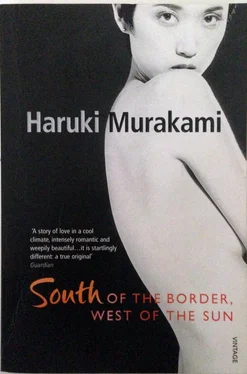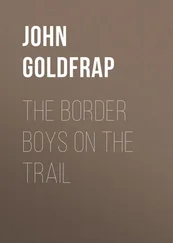“I thought you’d never come here again,” I said.
“Every time I see you, you say the same thing,” she said, laughing. As always, she sat down next to me at the bar and rested both hands on the counter. “But I did write you a note saying I wouldn’t be back for a while, didn’t I?”
“ For a while is a phrase whose length can’t be measured. At least by the person who’s waiting,” I said.
“But there must be times when that word’s necessary. Situations when that’s the only possible word you can use,” she said.
“And probably is a word whose weight is incalculable.”
“You’re right,” she said, her face lit up by her usual smile, a gentle breeze blowing from somewhere far away. “I apologize. I’m not trying to excuse myself, but there was nothing I could do about it. Those were the only words I could have used.”
“No need to apologize. As I told you once, this is a bar, and you’re a customer. You come here when you want to. I’m used to it. I’m just mouthing off to myself. Pay no attention.”
She called the bartender over and ordered a cocktail. She looked closely at me, as if inspecting me. “You’re dressed pretty casually for a change.”
“I went swimming this morning and haven’t changed. I haven’t had time,” I said. “But I kind of like it. I feel this is the real me again.”
“You look younger. No one would guess you’re thirty-seven.”
“You don’t look thirty-seven, either.”
“But I don’t look twelve.”
“True enough,” I said.
Her cocktail arrived, and she took a sip. And gently closed her eyes as if listening to some far-off sound. With her eyes closed, I could once more make out the small line just above her eyelids.
“Hajime,” she said, “I’ve been thinking about your bar’s cocktails. I really wanted to have one. No matter where you go, you can never find drinks like the ones here.”
“Did you go somewhere far away?”
“Why do you say that?” she asked.
“Something about you,” I replied. “A certain air. Like you’ve been gone for some time far away.”
She looked up at me. And nodded. “Hajime, for a long time I’ve….,” she began, but fell suddenly silent as if reminded of something. I could tell she was searching inside herself for the right words. Which she couldn’t find. She bit her lip and smiled once more. “Anyhow, I’m sorry. I should have got in touch with you. But I wanted to leave certain things as they are. Preserved, so to speak. Either I come here or I don’t. When I do come here, I do. When I don’t … I’m somewhere else.”
“There’s no middle ground?”
“No middle ground,” she said. “Why? Because no middle-ground things exist there.”
“In a place where there are no middle-ground objects, no middle ground exists,” I said.
“Exactly.”
“In a place where no dogs exist, there are no doghouses, in other words.”
“Yes; no dogs, no doghouses,” Shimamoto said. And she looked at me in a funny way. “You have a strange sense of humor, do you know that?”
As it often did, the piano trio began playing “Star-Crossed Lovers.” For a while the two of us sat there, listening silently.
“Mind if I ask you one question?”
“Not at all,” I said.
“What’s the deal with you and this song?” she asked. “Every time you’re here, it seems, they play that number. A house rule of some sort?”
“No. They just know I like it.”
“It is a beautiful song.”
I nodded. “It took me a long time to figure out how complex it is, how there’s so much more to it than just a pretty melody. It takes a special kind of musician to play it right,” I said. “Duke Ellington and Billy Strayhorn wrote it a long time ago. Fifty-seven, I believe.”
“When they say ‘star-crossed,’ what do they mean?”
“You know—lovers born under an unlucky star. Unlucky lovers. Here it’s referring to Romeo and Juliet. Ellington and Strayhorn wrote it for a performance at the Ontario Shakespeare Festival. In the original recording, Johnny Hodges’ alto sax was Juliet, and Paul Gonsalves played the Romeo part on tenor sax.”
“Lovers born under an unlucky star,” she said. “Sounds like it was written for the two of us.”
“You mean we’re lovers?”
“You think we’re not?”
I looked at her. She wasn’t smiling anymore. I could make out a faint glimmer deep within her eyes.
“Shimamoto-san, I don’t know anything about you,” I said. “Every time I look in your eyes, I feel that. The most I can say about you is how you were at age twelve. The Shimamoto-san who lived in the neighborhood and was in my class. But that was twenty-five years ago. The Twist was in, and people still rode in streetcars. No cassette tapes, no tampons, no bullet train, no diet food. I’m talking long ago. Other than what I know about you then, I’m in the dark.”
“Is that what you see in my eyes? That you know nothing about me?”
“Nothing’s written in your eyes,” I replied. “It’s written in my eyes. I just see the reflection in yours.”
“Hajime,” she said, “I know I should be telling you more. I do. There’s nothing I can do about it. So please don’t say anything further.”
“Like I said, I’m just mouthing off to myself. Don’t give it a second thought.”
She raised a hand to her collar and fingered the fish brooch. And quietly listened to the piano trio. When their performance ended, she clapped and took a sip of her cocktail. Finally she let out a long sigh and turned to me. “Six months is a long time,” she said. “But most likely, probably, I’ll be able to come here for a while.”
“The old magic words,” I said.
“Magic words?”
“ Probably and for a while .”
She smiled and looked at me. She took a cigarette out of her small bag and lit it with a lighter.
“Sometimes when I look at you, I feel I’m gazing at a distant star,” I said. “It’s dazzling, but the light is from tens of thousands of years ago. Maybe the star doesn’t even exist anymore. Yet sometimes that light seems more real to me than anything.”
Shimamoto said nothing.
“You’re here,” I continued. “At least you look as if you’re here. But maybe you aren’t. Maybe it’s just your shadow. The real you may be someplace else. Or maybe you already disappeared, a long, long time ago. I reach out my hand to see, but you’ve hidden yourself behind a cloud of probablys . Do you think we can go on like this forever?”
“Possibly. For the time being,” she answered.
“I see I’m not the only one with a strange sense of humor,” I said. And smiled.
She smiled too. The rain has stopped, without a sound there’s a break in the clouds, and the very first rays of sunlight shine through—that kind of smile. Small, warm lines at the corners of her eyes, holding out the promise of something wonderful.
“Hajime,” she said, “I brought you a present.”
She passed me a beautifully wrapped package with a red bow.
“Looks like a record,” I said, gauging its size and shape.
“It’s a Nat King Cole record. The one we used to listen to together. Remember? I’m giving it to you.”
“Thanks. But don’t you want it? As a keepsake from your father?”
“I have more. This one’s for you.”
I gazed at the record, wrapped and beribboned. Before long, all the sounds around me—the clamor of the people at the bar, the piano trio’s music—all faded in the distance, as if the tide had gone out. Only she and I remained. Everything else was an illusion, papier-mâché props on a stage. What existed, what was real, was the two of us.
Читать дальше












